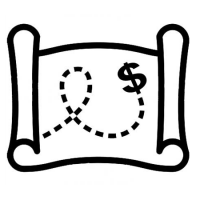Or, for yourself or another adult, if somebody put money in trust for you, and you haven’t claimed it yet. Many thanks to Mary Pitman, author of the Little Book of Missing Money, where I first saw this information.
Mary says that when a bank serves as a trustee and holds money for somebody, the account has a particular format:
•The first line is the name of the bank.
•The second line says FBO, which stands for “For the Benefit of” or “FAO” which stands for “For the Account of. Next comes the beneficiary’s name. So this line might say, FBO “Elisabeth Leamy” if I were a trust fund baby.
•The third and fourth lines are the mailing address of the bank, not the individual, because the bank, as trustee, receives correspondence on behalf of the beneficiary.
The problem is that when an account formatted like this becomes unclaimed property, it shows up in a state’s unclaimed money database in a wonky way. Since the bank’s name is first, THAT’s what shows up in the name field! So searching your own name won’t work because unclaimed money databases only scan the name field and your name isn’t in the name field. The bank’s is! So where DOES your name end up? The “FBO Elisabeth Leamy” would be on the next line, which is the address line in most or all state unclaimed money databases.
What to do? Mary has several tips:
•Try searching the name of banks you know your family used and then weeding through them to see if your name is in the address section.
•Try searching the words “for the benefit of” or the abbreviation FBO or FAO in the last name field.
•Also in the last name field, you could try entering common trust terminology: Trust, Trustee, irrevocable trust, revokable trust, Trust fund, Family trust, etc. Then, look for your own name in the other fields of the accounts you find.
To give you an idea, I went to MissingMoney.com and tried entering the word “Trust” in the last name field and got more than 200 results. I also experimented with “irrevocable trust” and found more than 25 accounts.
Yes, this is more work than a normal search, but it’s a treasure hunt and well worth it if you’ve always heard the lore that there used to be money in your family.
EPISODE 62~ FIND YOURS: Find Unclaimed Money Held in Trust for Children
Please follow and like us:

